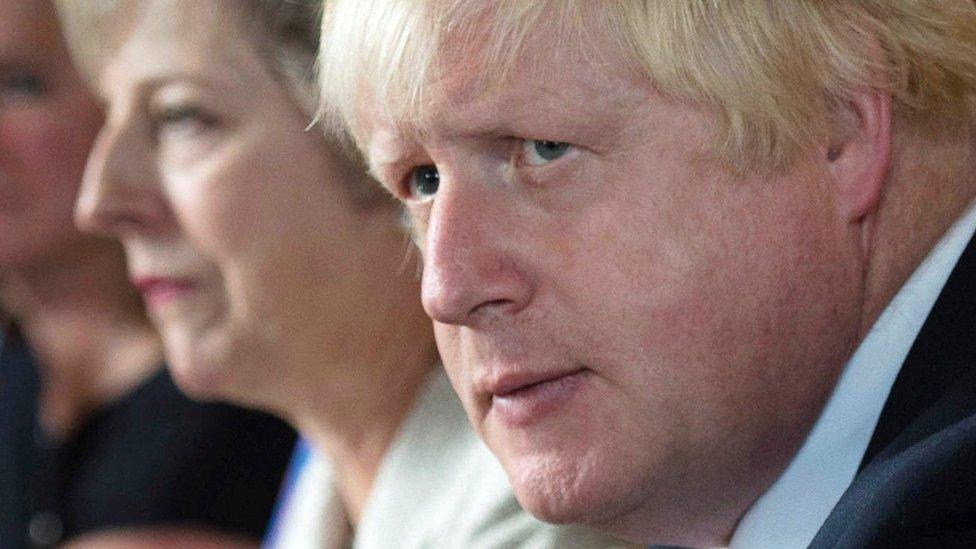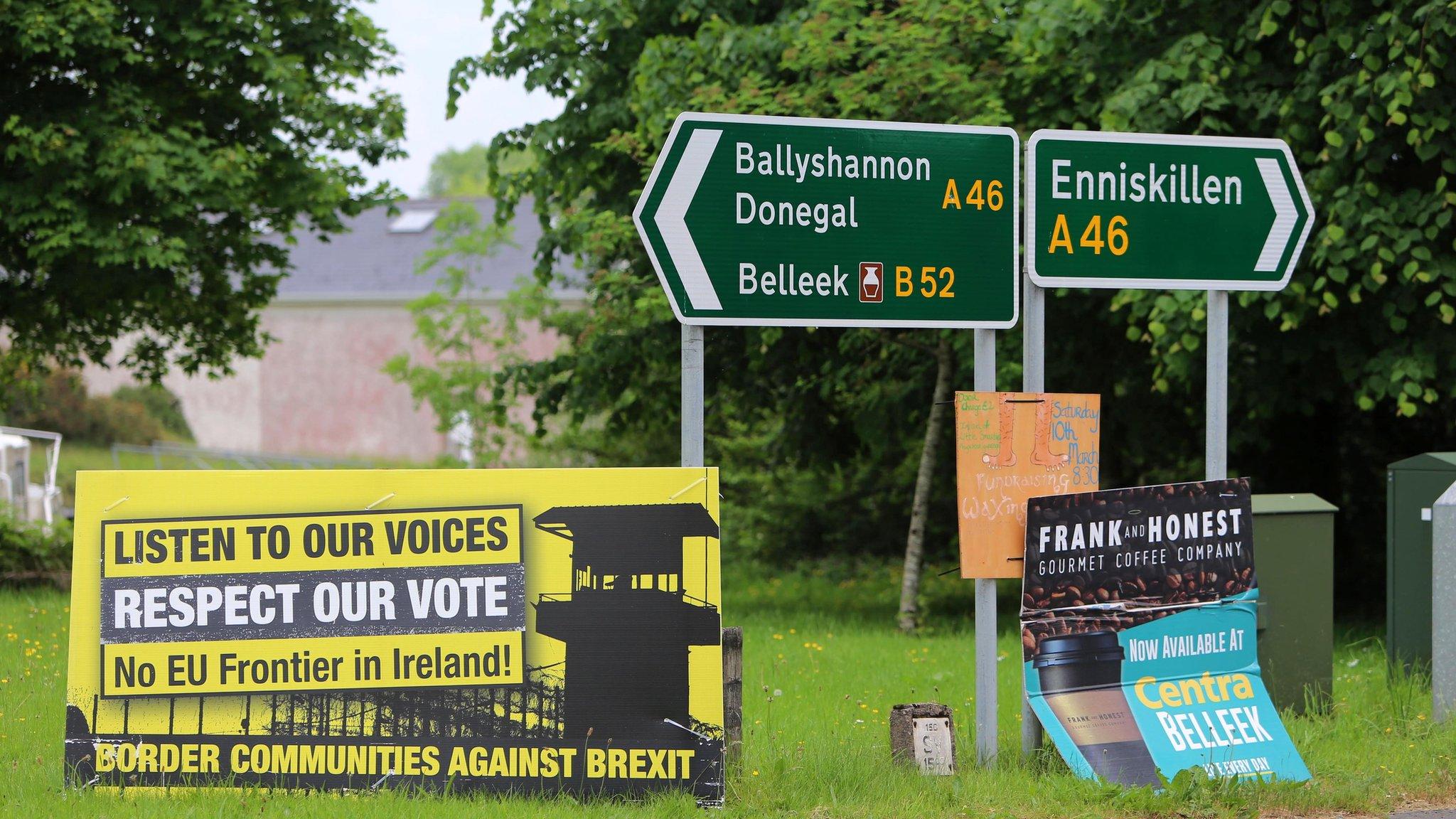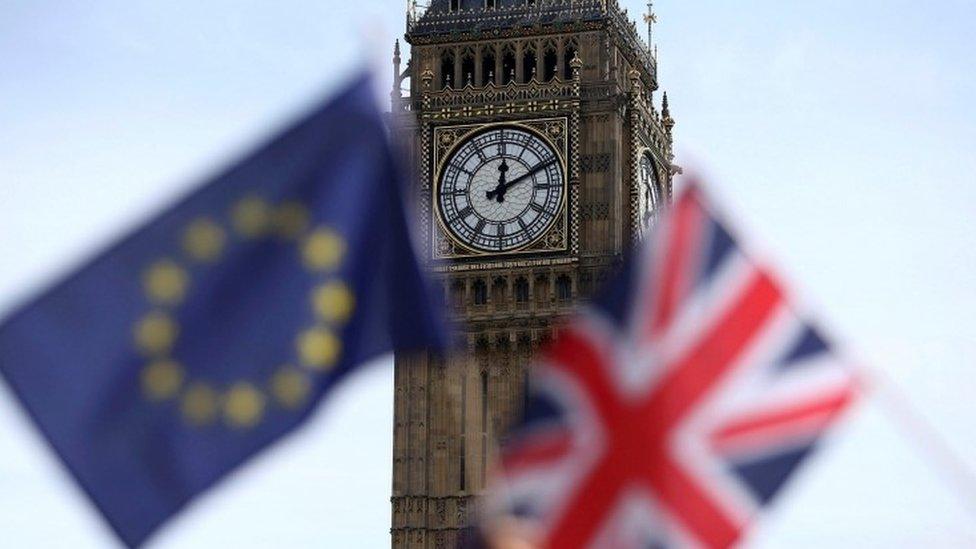Boris Johnson compares Chequers deal to 'suicide vest'
- Published

Boris Johnson has faced criticism from fellow MPs for his language in the Mail on Sunday article
Boris Johnson has attacked Theresa's May's Brexit plan, saying she had "wrapped a suicide vest" around the British constitution and "handed the detonator" to Brussels.
In the Mail on Sunday, external, the former foreign secretary said the Chequers deal was "feeble" and "pathetic".
He has been strongly criticised by some Tories - one minister said it marked a "disgusting moment" in politics.
And Home Secretary Sajid Javid called for "measured language" to be used.
Writing in the same paper, external, the current Foreign Secretary Jeremy Hunt called for people to rally behind Mrs May, backing her to hold the line "in the face of intense pressure".
The UK is leaving the EU on 29 March 2019, and the government's plan - agreed at Chequers in July - has sparked criticism from Brexiteer Tories as well as the EU.
In his article, Mr Johnson accused the EU of "bullying" the UK - but questioned why the response had been "so utterly feeble".
He said that rather than getting a "generous free trade deal", Britain is saying, "yes sir, no sir, three bags full sir", to Brussels.
"At every stage of the talks so far, Brussels gets what Brussels wants," wrote Mr Johnson.
"It is a humiliation. We look like a seven-stone weakling being comically bent out of shape by a 500lb gorilla."
Theresa May speaks after meeting her cabinet at Chequers in July
He said the reason for the UK's response was the "insanity of the so-called backstop" - the commitment by the UK and the EU to come up with a solution to avoid a hard border in Northern Ireland.
However, his call to scrap the proposed backstop has been heavily criticised by Sinn Féin and the SDLP.
Sinn Fein said Mr Johnson's comments were "foolish and dangerous", while the SDLP said he had "absolutely no regard for people on this island".
The BBC's political correspondent Alex Forsyth said the "scathing remarks" by Mr Johnson showed his "willingness to challenge the prime minister remains undimmed" after recent revelations about his private life.
It is Mr Johnson's second attack on the prime minister's Brexit strategy inside a week, as last Monday he said the Chequers deal "means disaster" for Britain - Downing Street responded to that attack by saying he had offered "no new ideas".
'Hurtful analogy'
While Mr Javid voiced measured criticism of Mr Johnson, other Tories reacted more angrily to his remarks.
Former Army officer and chairman of the Foreign Affairs Select Committee Tom Tugendhat graphically described the aftermath of a suicide bomb that had gone off near his office in Helmand province, Afghanistan.
He said comparing such an attack to the PM's plans "isn't funny", adding: "Some need to grow up".
Allow X content?
This article contains content provided by X. We ask for your permission before anything is loaded, as they may be using cookies and other technologies. You may want to read X’s cookie policy, external and privacy policy, external before accepting. To view this content choose ‘accept and continue’.

Foreign Office Minister Sir Alan Duncan criticised his former boss, saying the article, external was "one of the most disgusting moments in modern British politics."
If this latest broadside was not the end of Mr Johnson's political career, "I will make sure it is later", he said.
Another Foreign Office minister, Alistair Burt, tweeted: "I'm stunned at the nature of this attack. There is no justification for such an outrageous, inappropriate and hurtful analogy.
"If we don't stop this extraordinary use of language over Brexit, our country might never heal. Again, I say, enough."
But backbench Tory MP Nadine Dorries defended Mr Johnson in the face of what she was "vitriol", saying his critics were "terrified of his popular appeal".
And Tory Brexiteer Andrew Bridgen said the way Mr Johnson "says it how he sees it and speaks truth unto power" was "something that endears him to a huge swathe of the British public".
On the BBC's Andrew Marr Show, Mr Javid said: "I think there are much better ways to articulate your differences. I think it's a reminder for all of us in public policy, whichever political party we represent, to use measured language because I think that's what the public want to see."
He backed the Chequers proposals which he said represented "the only deal that we've got on the table".
In his Mail on Sunday article, Mr Hunt said Parliament would get to debate and vote on any agreement, adding: "Until then, we should not rush to judgement on a deal that is still under negotiation."
Johnson 'dossier'
It is the first public comment from Mr Johnson since he and his wife, Marina Wheeler, confirmed they were getting divorced earlier this week.
The announcement followed newspaper allegations the former London mayor had been having an extra-marital affair.
The Sunday Times has reported, external that Mrs May's aides wrote a 4,000-word "dirty dossier" on Mr Johnson in 2016, exposing a "catalogue of lurid allegations" against him.
The paper says it has seen the document - said to have been written during the Conservative leadership contest - but officials at Downing Street and Conservative Campaign Headquarters have denied circulating it.
No-deal 'disorder' claim
Elsewhere the National Police Chiefs' Council said there was no intelligence to suggest there would be an increase in crime or disorder if the UK and the EU cannot agree a deal.
NPCC operations lead Chief Constable Charlie Hall was responding to a Sunday Times report, external of a leaked document about police contingency plans for a no-deal Brexit.
According to the paper, the document warned that concerns around medical supplies could "feed civil disorder", and that potential goods shortages raised concerns of "widespread protest which could then escalate into disorder".
It also warned that the "necessity to call on military assistance is a real possibility" in the weeks after UK's departure from the EU.
Mr Javid said he did not expect a no-deal outcome, adding: "I'm glad the police and other experts are looking into this and thinking what might happen in a no-deal scenario."
- Published7 June 2018

- Published6 September 2018
- Published22 August 2018
